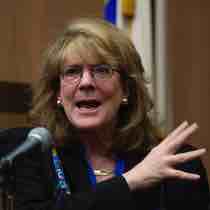 – Diana Simmons, CLA member, Sydney.
– Diana Simmons, CLA member, Sydney.
With the vexed issue of false memory dividing legal authorities, courts, social groups and families worldwide, a global expert on the topic spoke in Sydney in January 2017 to a packed auditorium at Sydney University.
With the vexed issue of false memory dividing legal authorities, courts, social groups and families worldwide, a global expert on the topic spoke in Sydney in January 2017 to a packed auditorium at Sydney University.
Professor Elizabeth Loftus (photo) is a Distinguished Professor of Psychology & Social Behaviour, and Professor of Law, at the University of California – Irvine. She has published 23 books and over 500 scientific articles on the malleability of human memory.
Her research mainly involves creating false memories in the minds of people and comparing them to true memories. These studies have shown that we are all susceptible to false memory, even those among us with ‘superior memory’.
In 2008, as a presidential candidate, Hillary Clinton told of being under sniper fire during a visit with her daughter to Bosnia in 1996. Videos of the event showed her being greeted by Bosnians and presented with flowers. Strange that such a highly educated person would ‘misremember’ when it was plain that had not happened.
Some ways of contaminating memory are to give the person false information, misidentify a situation, deprive them of sleep, and suggestive questioning.
People can be lead to believe they were attacked by a vicious dog as a child, rescued cats up trees and cheated on a game. In another study where 423 subjects were given false information about a past event in a shopping centre, 30% recalled a ‘rich’ memory of the event and 20% had a ‘strong belief’ that the event occurred.
The ‘lost in the mall technique’ found that an average of one-third of experimental subjects could become convinced that they experienced things in childhood that had never really occurred—even highly traumatic, and impossible, events.
Once planted, ‘false memories’ are similar to ‘true memories’ and can be recalled with intensity and emotionality. False memories are difficult to remove. Prof Loftus’s research shows that we are a long way from being able to tell true memories from false ones.
Creating a false memory of rescuing a cat I consider benign. However, it is different in criminal cases where it is one person’s word against another and someone’s ‘false memory’ leads to another’s wrongful conviction.
Loftus told of 300 cases of wrongful convictions in the USA where some had spent 25 years in prison. DNA testing has helped further the cause of justice, as has the videotaping of interrogations. Memory therapy costs are not recoverable under Medical Insurance in the USA.
Loftus says she has developed a tolerance of people’s poor recall. Often they are not deliberately lying. However, her take home message is that just because someone tells you something, however intensely, it does not mean it really happened. You need corroboration of the event, particularly in a court room.
For more information: http://tinyurl.com/hu9fa8u

